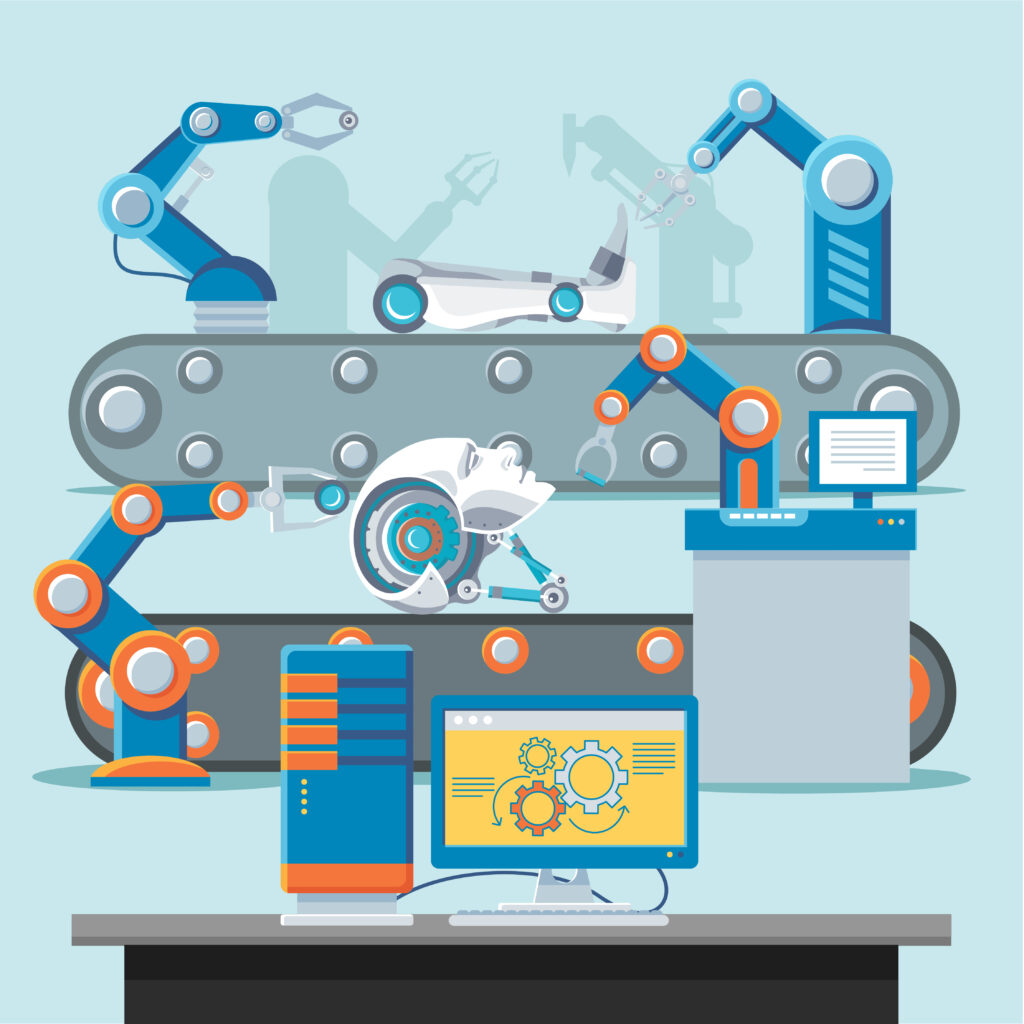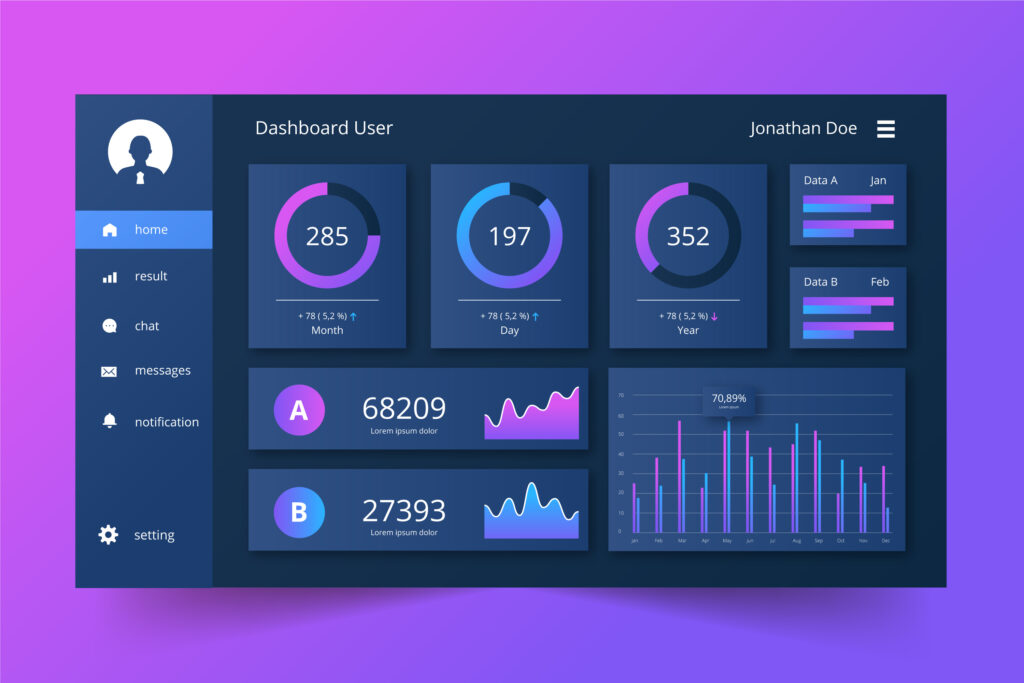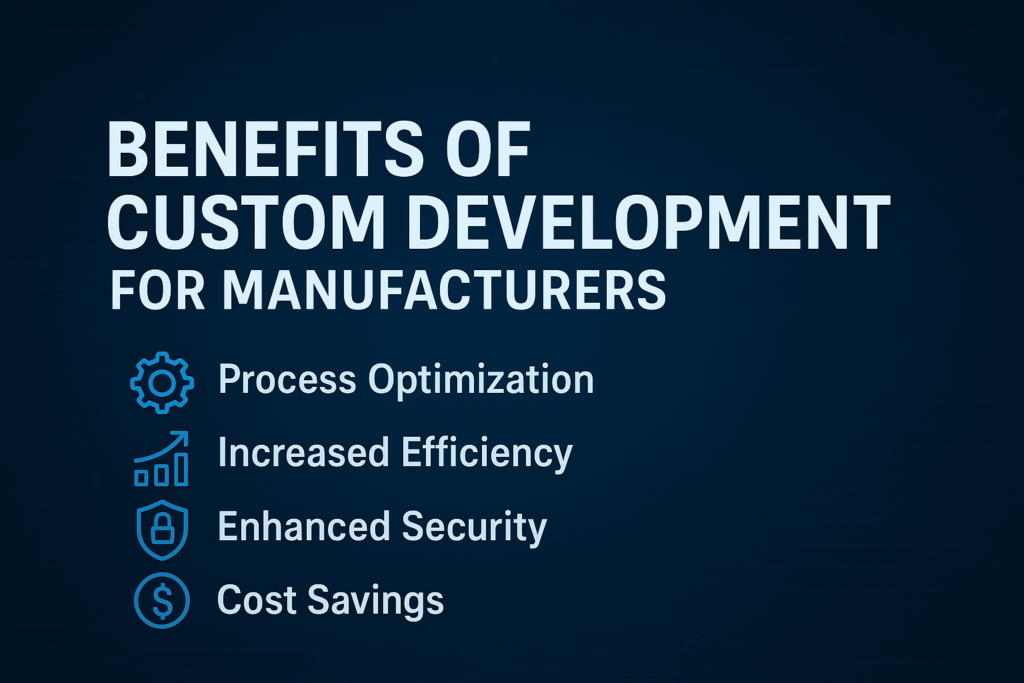Smart manufacturing is changing the way industries operate by combining advanced technology with efficient processes.
Instead of relying on standard software that fits only part of a company’s needs, manufacturers are turning to custom development.
Tailored solutions are helping them improve production, reduce waste, and maintain flexibility in an increasingly competitive market.
What is custom development in manufacturing?
Custom development refers to creating software solutions tailored to a company’s specific needs, rather than relying on off-the-shelf products.
In manufacturing, this often means creating applications that integrate with machines, collect real-time data, and support automation without unnecessary features that slow operations.
For example, a factory using different machines from multiple vendors needs a unified platform for monitoring.
A custom-built system connects all devices, giving real-time visibility and predictive insights.
Impact of Custom Development on Smart Manufacturing
Custom development goes beyond enhancing traditional systems; it serves as a key driver for smart manufacturing. Here’s how it is making a significant difference:
1. Seamless Integration of Machines and Systems
Modern factories rely on multiple machines, robotics, and sensors that often come from different manufacturers.
Standard software struggles to integrate these diverse systems, resulting in data silos and communication gaps.
Custom-built solutions solve this problem by creating a unified ecosystem where all machines and platforms exchange data seamlessly.
This integration improves operational visibility, helps track performance across every production stage, and ensures smooth coordination between hardware and software.
The ability to consolidate information in one dashboard enables faster decision-making, reduces downtime, and enhances productivity.
Without integration, even advanced machines cannot deliver their full potential.
Custom development enables smooth communication between all components in the manufacturing line, creating an optimized and efficient process.

2. Real-Time Data Analytics
Manufacturing environments generate massive amounts of data through IoT devices, sensors, and production systems.
Off-the-shelf solutions cannot often process this data efficiently in real time.
Custom applications, on the other hand, are designed to handle large data volumes quickly and accurately.
They provide actionable insights on equipment performance, production quality, and energy consumption, allowing managers to make informed decisions instantly.
Real-time analytics also supports predictive maintenance by identifying early warning signs of equipment failure, reducing unplanned downtime and repair costs.
This level of data visibility enables better scheduling, improved resource allocation, and optimized supply chains.
Custom development turns raw data into actionable insights, helping businesses ensure quality, cut waste, and prevent issues early.
3. Process Automation
Automation is a key component of smart manufacturing, and custom development makes it more effective.
Repetitive processes like quality inspections, inventory checks, and order scheduling consume significant time when done manually.
Custom-built software can automate these tasks with precision, reducing human error and accelerating production cycles.
For example, automated quality checks can immediately detect defects on assembly lines, ensuring only products that meet standards move forward.
Similarly, automated inventory management systems can track stock levels in real time and trigger replenishment when needed.
This minimizes downtime and avoids expensive interruptions in production. Automation also enhances worker safety by minimizing manual handling of hazardous tasks.
Custom automation tools allow businesses to create workflows that align perfectly with their operations, resulting in faster, more accurate, and cost-efficient processes across the production line.
4. Scalability for Future Growth
A major limitation of standard manufacturing software is its inability to scale with growing business needs.
As companies expand operations, add new product lines, or adopt advanced technologies, generic software often becomes restrictive.
Custom development eliminates this problem by building scalable systems that grow alongside the organization.
Businesses can add new features, modules, or integrations without replacing the entire system, saving time and cost.
For example, a company starting with basic automation today can easily integrate AI-driven predictive models later without system overhauls.
This adaptability supports long-term stability and reduces interruptions when implementing upgrades.
Scalability also supports global expansion, as custom systems can adapt to different regulatory requirements and regional practices.
By investing in scalable solutions, manufacturers future-proof their operations and maintain a strong competitive advantage in evolving markets.

5. Enhanced Security
Cybersecurity is a growing concern in smart factories, where machines, sensors, and systems are interconnected through the industrial internet.
Off-the-shelf solutions often use generic security protocols that may not address industry-specific risks.
Custom development allows businesses to implement tailored security measures that fit their unique infrastructure.
These may include role-based access controls, encrypted data transfers, and real-time threat monitoring systems.
A custom-built platform can also integrate with advanced security tools for detecting intrusions and mitigating cyber threats before they cause damage.
This level of customization reduces the risk of data breaches, intellectual property theft, and system downtime caused by attacks.
Robust security measures safeguard sensitive production data while ensuring adherence to industry standards.
Prioritizing security in custom software can help manufacturers safeguard their operations and maintain trust with clients and partners.
6. Improved Supply Chain Management
Supply chains are complex, involving multiple vendors, transportation channels, and real-time tracking requirements.
Standard software often struggles to manage this complexity efficiently.
Custom development enables businesses to build supply chain solutions that offer full visibility across every stage.
Manufacturers can track raw materials from suppliers, monitor in-transit shipments, and manage inventory with real-time updates.
These systems can also integrate predictive analytics to forecast demand, helping businesses avoid stockouts or overproduction.
Enhanced visibility improves coordination between procurement, production, and distribution, leading to faster turnaround times and cost savings.
In addition, custom supply chain platforms can be tailored to handle compliance requirements in different regions, making them ideal for companies operating globally.
By improving transparency and responsiveness, custom development strengthens supply chain resilience and reduces risks associated with disruptions.
7. Personalized User Interfaces and Dashboards
Standard manufacturing software often comes with generic dashboards that provide limited control and visibility.
Custom development allows businesses to create user interfaces that align with their specific operational needs.
For example, managers can access dashboards that display real-time production metrics, energy consumption data, and equipment status on a single screen.
Operators can receive customized alerts for machine maintenance or quality issues.
These personalized dashboards improve decision-making by presenting only the most relevant information to each user role.
A well-designed interface also enhances user experience, reducing training time and minimizing errors caused by complex navigation.
Offering complete control over data presentation, custom dashboards keep teams informed and proactive, improving efficiency and operational outcomes.

Types of Custom Solutions in Smart Manufacturing
Here are the most common types of custom applications manufacturers are adopting:
Manufacturing Execution Systems (MES)
These systems provide real-time tracking and control of manufacturing processes. They monitor production schedules, machine performance, and quality standards from start to finish.
Unlike generic MES platforms, they integrate seamlessly with existing systems, offering interactive dashboards, advanced analytics, and automation features to improve efficiency, reduce downtime, and ensure consistent product output.
IoT Integration Platforms
These platforms connect machines, sensors, and devices for uninterrupted data flow in smart factories.
They collect real-time operational data and transmit it to centralized dashboards for analysis.
Integrating diverse hardware and protocols, they eliminate compatibility issues, enable predictive analytics, and help manufacturers make faster, data-driven decisions with greater accuracy.
Predictive Maintenance Tools
Such tools analyze machine data to forecast potential failures before they occur.
Using IoT sensors and AI algorithms, they detect anomalies early, reducing unexpected downtime and repair costs.
Proactive maintenance scheduling improves equipment lifespan, optimizes resource allocation, and ensures smooth production processes without major disruptions, saving time and operational expenses.

Custom ERP Modules
These ERP modules unify manufacturing, inventory, and supply chain processes under a single dashboard.
They deliver real-time visibility across operations and integrate easily with specialized manufacturing tools.
Designed for scalability and efficiency, they offer advanced analytics that supports better decision-making and improved workflow management across departments for long-term business success.
Automation Scripts & Robotics Control
Automation scripts and robotics control systems enhance the performance of robotic arms, conveyors, and automated lines.
They program machines for precise, repetitive tasks to ensure accuracy and speed.
By adjusting control logic, manufacturers gain flexibility, minimize human error, and quickly adapt automated operations to meet evolving production demands.
Benefits of Custom Development for Manufacturers
The adoption of custom-built software in smart manufacturing delivers multiple benefits that improve productivity and cost efficiency.
One major advantage is higher operational efficiency, as tailored systems reduce manual errors and speed up workflows.
Manufacturers can also achieve significant cost savings by minimizing downtime, improving resource allocation, and optimizing maintenance schedules.
Another key benefit is the ability to make informed decisions based on accurate data from integrated systems.
These insights support demand forecasting, inventory planning, and pinpointing opportunities for improvement.
Custom development also provides a competitive edge by allowing businesses to quickly adapt to changing industry trends and customer needs.
Additionally, security is enhanced because custom solutions can include specific protocols to protect sensitive data.
Overall, these benefits make custom development a vital tool for any manufacturer looking to thrive in a technology-driven environment.

Challenges of Implementing Custom Development
While custom development offers significant advantages, businesses must also consider the challenges that come with it.
The most common concern is the initial investment, which is often higher than purchasing standard software.
Developing a tailored solution takes time, as it requires in-depth planning, coding, and testing before deployment.
Another challenge is the need for a skilled technical team that can handle development, integration, and ongoing maintenance.
Without the right expertise, businesses risk delays and increased costs during implementation.
Additionally, custom systems must be regularly updated to remain compatible with new technologies and security standards.
These challenges, however, are temporary compared to the long-term benefits of flexibility, scalability, and better control.
Companies that plan carefully and partner with experienced developers can overcome these hurdles and achieve significant returns on their investment in custom-built solutions.
Future of Custom Development in Smart Manufacturing
As industries adopt Industry 4.0 technologies, the need for tailored solutions will keep growing.
With AI, machine learning, and robotics becoming core elements, manufacturers will rely on custom-built platforms to handle advanced automation, predictive analytics, and global supply chain integration.
How can Brandout empower manufacturers through custom development for smart manufacturing?
Brandout empowers manufacturers with custom development solutions designed for smart manufacturing.
Our services include seamless IoT integration, real-time data analytics platforms, and automation tools that align with your unique processes.
With Brandout, you get scalable, secure, and performance-driven systems that optimize production, reduce downtime, and enable predictive maintenance for maximum efficiency.
Conclusion
Custom development is transforming smart manufacturing by providing solutions that integrate systems, deliver real-time analytics, automate processes, and ensure scalability.
It enhances security, strengthens supply chain management, and creates intuitive dashboards for better decision-making.
While the initial investment may be higher than standard solutions, the long-term benefits in efficiency, flexibility, and competitiveness make it essential for businesses to embrace Industry 4.0.
Manufacturers that invest in custom-built systems position themselves for growth, adaptability, and innovation in a rapidly evolving industrial landscape.
Frequently Asked Questions
Why is custom development important for smart manufacturing?
It improves security, optimizes supply chain management, and delivers intuitive dashboards for smarter decision-making. This improves system integration, enhances efficiency, and ensures scalability for future growth.
How does custom development support Industry 4.0?
It enables seamless integration of IoT devices, AI algorithms, and automation systems. This makes manufacturing processes smarter, more connected, and capable of real-time decision-making.
Is custom development expensive?
The initial investment is higher than standard solutions. However, the long-term benefits, such as reduced downtime, better efficiency, and scalability, make it cost-effective over time.
Can small manufacturers afford custom development?
Yes, small businesses can begin with scalable modular solutions or cloud-based platforms. These allow gradual implementation without heavy upfront costs, making customization more accessible.
What’s the biggest advantage of custom-built software?
Flexibility. Custom software adapts to your unique workflows and processes, unlike generic tools that require you to change how you operate.




